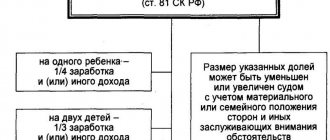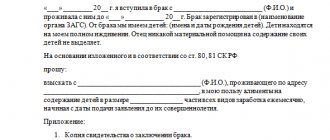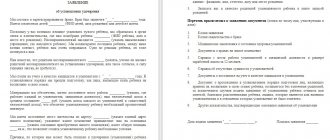It can happen to everyone in the family that one day the spouses decide to end their relationship. Divorce and alimony, and how child support is paid after a divorce are not simple questions to which everyone wants an answer. Most often, the child in such a situation remains with the mother. Of course, if a father loves his child and is decent, he will provide for him financially without question. However, in life, unfortunately, there are not so many such fathers. Therefore, the mother must defend the interests of their common child through the court until he turns 18 years old.
The relevance of the question of how to apply for alimony after a divorce is obvious, and in this article we will understand all the intricacies of this procedure.
Does a citizen have the right to file a claim to receive alimony from his ex-spouse?
According to the norms of family law, there is a certain circle of persons entitled to receive alimony payments if the spouses are divorced.
It includes:
- persons who have not reached the age of majority and were born (adopted) in marriage;
- persons who have reached the age of majority, however, are recognized as incapacitated due to health conditions or other reasons (disability, full-time study, etc.);
- one of the spouses who is recognized as disabled and therefore unable to provide for himself;
- one of the spouses who is caring for a minor (a child under 3 years old), and therefore cannot provide for himself financially;
- a woman pregnant with a common child.
In the last two cases, the person claiming payments for the child has the right to demand alimony for his own maintenance as well.
Peaceful resolution of the issue of payment of child support - procedure
Current legislation does not prohibit resolving the issue of providing financial assistance to a child in a peaceful manner.
If it was decided to reach an agreement without court, then the parents must enter into an agreement between themselves on the payment of child support. The procedure for carrying out such a procedure is regulated by the provisions of Chapter 16 of the RF IC.
This document is an official agreement that defines such key conditions as the amount of payments for a common child, the conditions for their calculation and the procedure for their provision. There are two parties involved here:
- a person who is responsible for financial support of a minor;
- the recipient of these funds in the person of the child's legal representative (in this case it may be the mother or father, guardian, adoptive parent).
The process of concluding an agreement on the payment of child support for common children includes the following main stages:
- Preparing the document itself - you can do this yourself or contact a competent specialist. It is preferable to choose the latter option.
- Collecting the necessary papers that will be required from the notary.
- A visit to the notary's office to certify the agreement signed by both parties.
The agreement on the payment of alimony has the force of a writ of execution, therefore, if the other party fails to comply with its terms, the recipient of the funds can initiate enforcement proceedings.
What documents will be required?
To notarize an agreement to pay child support for a common child, applicants must collect the following documents:
- passports of both parties, that is, father and mother;
- certificate of birth of a common child;
- draft agreement on payment of maintenance for a minor;
- documents confirming the income received by the alimony payer during the last 3 months (for example, a bank account statement, a certificate from the workplace);
- payment details to which the money will be transferred.
ATTENTION! Concluding an agreement is a paid procedure. It includes the following main expense items: payment of the state fee for notarization of the document and payment for the services of a specialist who drafted the text of the agreement (if the parents asked for outside help).
The procedure for preparing an agreement on the payment of alimony
At the legislative level, a unified form of agreement on the payment of alimony has not been approved. However, it should include the following key sections:
- Information about the place and time of concluding such an agreement, personal data of both parties (full names of parents, passport details, information about registration and place of residence).
- Subject of the agreement - this section indicates that the payer undertakes to pay financial assistance for a common child. This also includes information about the recipient of the funds and the amount of the salary.
- Form of alimony payment and terms - this specifies how the payment will be made (for example, a fixed payment, a percentage of wages, etc.), as well as the exact date of each month when remittances should be received.
- Rights and obligations of both parties to the agreement.
- The period of time during which a document remains in force.
At the very end of the agreement there must be a signature of the payer and the recipient of payments for a common child.
Do I need to get it certified by a notary?
Yes, this is a mandatory condition, which is enshrined in paragraph 1 of Art. 100 IC RF. In case of non-compliance, such a transaction will be considered void. This conclusion follows from paragraph 3 of Art. 163 Civil Code of the Russian Federation.
Where to apply for alimony after divorce
If you turn to legal practice, you can find several ways to resolve the issue of where to go to apply for alimony after a divorce. Moreover, it makes no difference whether payments are assigned during the marriage or after its dissolution.
You can apply for alimony:
- in a notary’s office - if the child’s parents have come to an agreement regarding payments;
- to a judicial authority - to issue an order;
- to the court to file a claim for alimony.
These methods have their own characteristics, so we will dwell on each of them in detail.
Notary
The execution of a notarial agreement takes place in cases where a husband and wife agree on the financial support of their child. Thus, the spouses independently and mutually agree on the amount of payments, the method of transferring funds, as well as their frequency.
As for the law, if ex-spouses agree, it gives them complete freedom to do so. The only point that must be taken into account is the amount of financial payments, in particular, it should not be lower than the one ordered by the court. Therefore, when concluding such an agreement with a notary, the specialist needs to keep this issue under control.
Judicial authorities
If the ex-husband does not want to resolve the issue voluntarily, the woman has to go to court for help. Thus, the judicial authority can collect alimony in case of divorce for child support:
- through the issuance of an order;
- through a court decision.
To make the order, the child's mother must make a simple statement. This procedure is a simplified version when compared with lawsuit proceedings. However, this option cannot always be resorted to, but only if certain circumstances occur, namely:
- if the stated requirement comes separately, without additional ones;
- when it comes to collecting alimony in percentage form, and not in a fixed amount;
- if the father has no objections.
Magistrate's Court
Issues related to alimony are most often resolved with the involvement of a magistrate. Thus, the Civil Procedure Code provides that a person can apply to the magistrate’s court with a corresponding application. The magistrate decides ordinary situations related to payments for child support, but if the following circumstances occur, a decision is therefore not made:
- The applicant wishes to recover child support for an adult child.
- A recovery is required against one of the spouses.
- The alimony obligee is already paying child support for another child.
- There are disagreements between the spouses on any issue.
Important! If one of the above problems exists, you must go to the district court for a solution.
Where to resolve the issue
If we systematize everything that was said earlier, the places to resolve the issue of alimony are:
- Magistrates' Court - when the payment of alimony is complicated by the presence of certain circumstances;
- notary – if the spouses have agreed on payments;
- district court - in the presence of circumstances in which a peaceful resolution of the issue is excluded.
Lawyer's answers to private questions
Is it possible to collect alimony retroactively?
According to Art. 107 of the RF IC, recipients can collect alimony for the past three years, provided that before going to court, measures were taken to voluntarily demand alimony from the alimony obligee. Filling out a claim “retroactively” is not allowed - this violates the law, and the documents will not be accepted. The application is signed on the actual date, but if the decision is positive, payments are accrued for the last 3 years.
Is it possible to apply for alimony from yourself?
In procedural legislation, the plaintiffs are the recipients of alimony, and the defendants are the payers. If a man cannot agree with his ex-wife on payments and she refuses them, it will not be possible to recover them from himself through the court. There are other options:
- Drawing up an alimony agreement.
- Opening a bank account in the child's name. Upon reaching 18 years of age, he will be able to use the money.
It is not recommended to hand over cash without a receipt, otherwise, even if the payment is made in good faith, the woman will be able to repeatedly demand payment through the court.
For more information on the procedure to follow if your spouse refuses alimony, read this article. Can I re-apply for child support?
Re-filing a claim in court is allowed if the requirements, circumstances or defendant change. In other cases, secondary appeal is not allowed. If the decision to collect payments has been made, there is no point in filing the claim again - it will not be accepted. To appeal, you should contact the appellate or cassation authority. Read more about the possibility of re-filing a claim here.
If parents file for child support, how much will they have to pay?
Payments are assigned in a fixed amount from adult able-bodied children (Article 87 of the RF IC). If there are several of them, the court may distribute the obligations to them in equal shares, even if the plaintiffs claim recovery from only one of them.
If the child’s mother applied for alimony in a fixed amount, but I have an official income, is this legal?
Yes. To assign payments to the TDS, it is not necessary that the defendant does not have an official job. For example, they can be recovered if alimony in shares does not allow one to properly provide for a common child (Article 83 of the RF IC).
Application deadlines
Many people are interested in the question of when can they apply for alimony after a divorce. As for the terms of application, they directly depend on the person for whom they are collected.
Article 90 of the Family Code of the Russian Federation contains a direct indication of persons who can claim alimony after the dissolution of marriage.
We are talking about the ex-wife:
- Who is pregnant and the father of the child is her ex-husband.
- Who is caring for her ex-husband’s baby on maternity leave for up to 3 years.
- Or ex-husband, forced to care for their common child, who has a disability before he reaches 18 years of age (this rule does not apply to disabled children from childhood).
- Or a husband who lost his ability to work no later than 1 year after the divorce.
- Or an ex-husband who received pensioner status no later than 5 years after the divorce.
Taking into account all of the above, the timing of alimony payments will be as follows:
- if alimony is paid for the maintenance of a child - until he reaches the age of majority (18 years);
- in case the payments go to the spouse who takes care of the newborn - until the baby reaches 3 years of age;
- when paying alimony for a spouse of retirement age - no later than 5 years after divorce;
- when alimony is paid for the needs of a person who is looking after a disabled child - until he reaches 18 years of age;
- if alimony goes to the needs of a person who looks after a child who has been disabled since childhood - indefinitely.
Arbitrage practice
Through the courts, alimony is collected both from children and from other relatives. Here are some examples:
- The woman collected payments from her husband for herself until the common child turns three years old. The man was obliged to pay one monthly subsistence minimum (LM) (Decision No. 2-504/2020 2-504/2020~M-370/2020 M-370/2020 dated May 29, 2021 in case No. 2-504/2020) .
- The child's mother demanded payment for the past period and wanted to assign alimony from the defendant. By decision No. 2-1644/2020 of May 22, 2020, in case No. 2-456/2020(2-4714/2019;)~M-4400/2019, the requirements were partially satisfied. The court ordered the man to pay money to support the child until he comes of age, but the plaintiff was unable to recover payments for the previous period.
- The woman filed for alimony from an unemployed debtor for a minor; a court order was issued on July 29, 2010 in case No. 2-517/2010.
Before going to court
Before going to court, it is worth finding out in what proceedings payments will be collected. There are two options, namely:
- writ proceedings.
- claim proceedings.
Next, let's look at what the difference between them is.
Order proceedings
As a matter of writ proceedings, a court order is issued. This procedure is considered more simplified. So, for example, the application is considered by the judge alone, there is no need to appear at court hearings, there are no disputes and debates between the parties. Based on the results of consideration of the application, the court issues a court order, which can already be handed over to a bailiff.
Claim proceedings
If it is not possible to collect alimony payments through writ proceedings, you can file a claim.
If we compare writ and lawsuit proceedings, the latter is considered more complicated, since it requires the participation of both parties in the consideration and, as a rule, takes longer in terms of time. However, this proceeding allows us to resolve all the issues that the parties have.
Based on the results of consideration of the claim, a court decision is made to recover payments for child support. Next, a writ of execution is drawn up, with which the plaintiff can independently go to the bailiff.
After 18 years
According to the law, child support is paid until they reach the age of majority, which is reached on the day they turn 18 years of age. But there are exceptions when funds continue to be withheld.
For example, when studying full-time, the parent is required to pay until the age of 24, since the child is not yet considered able to work.
List of documents:
- statement of claim;
- identification documents of the plaintiff, defendant and child;
- certificate from the educational institution;
- certificates confirming the income of the parties;
- If the child has a disability due to which child support continues to be calculated, all medical certificates must also be submitted.
What documents are needed to apply for alimony?
Any application must be accompanied by certain documents. Let's consider what package of documents needs to be collected to file a claim for alimony:
- Copies of all official papers: passports, certificates.
Certificate of family composition. The next step is to visit the housing department at your place of residence to obtain a certificate of family composition. If the other party lives at a different address, it is necessary to obtain a similar document at his place of residence. This may require an application addressed to the head of the housing department with a similar request, for which it must be indicated that the document is needed to be presented to the court. When the place of residence of a party is unknown, search measures must be applied, and the court issues a corresponding document.- Next, a calculation of the amount of alimony and its justification is drawn up. This requirement is written in the Code of Civil Procedure, so its implementation is mandatory. This may require collecting evidence, for example, checks or receipts that would indicate expenses spent on the maintenance, upbringing or education of the child.
- If the party submitting the application is aware of both official and unofficial sources of income of the second party, he must certainly indicate this fact in the application. Thanks to this measure, the court will accommodate the issue, which will relate to a certain amount of payments.
- If the question concerns the collection of alimony for the past period, it would be useful to collect information about the defendant’s property.
In a civil marriage
The negative side of such a union is the lack of obligations to each other, at the legislative level, and all issues regarding the division of property, children or payment of alimony are best resolved peacefully.
If a couple has children together, then the party with whom they remain also has every right to demand funds from the former cohabitant for his maintenance.
For registration, you must prepare the following documents:
- Statement of claim.
- Photocopy and original passports.
- Certificates of income of the applicant.
- Certificate of family composition.
- Documents proving paternity.
As for paying the state fee, this responsibility passes to the defendant.
How to file a claim for alimony
Nowadays, finding a sample statement of claim for the collection of child support is not a problem. For example, it can be found in the court office or simply downloaded via the Internet. However, many are not confident in their own abilities, so they have to seek qualified help from lawyers. In fact, this is not such a bad option. After all, only a specialist can not only help by correctly drafting the paper, but also give recommendations regarding the legal process. Naturally, you will have to spend money on such services, but in the end it will be worth it.
In the header of the application they write the name of the addressee, information about the parties, and it is also necessary to indicate the price of the claim.
The following must be indicated directly in the text of the application:
- That the parties were married.
- The parties have a child(ren).
- Information about who the child currently lives with.
- Who is now involved in the upbringing, education, and full financial support of the child.
- Does the defendant have children who were born in another marriage and, accordingly, does he pay child support?
- At the end of the claim, it is necessary to indicate in what form and amount alimony payments will be made.
- At the very end there is a list of documents that will be attached to the claim.
- Date of.
- Signature and full name of the plaintiff.
Regarding the amount of alimony, the legislation provides for a certain procedure for paying child support during a divorce:
- Child support for one child is collected every month in the amount of no more than 25% of income received.
- alimony in case of divorce for two children – no more than 33.3%.
- Child support for three children – no more than 50%.
Attention! In order to apply for alimony for child support, it is not at all necessary that the man and woman be officially married. If they are not written down, one of the parties still has the right to alimony. The only point worth considering in such a situation is that in court it will be necessary to prove their cohabitation.
A sample statement of claim for the collection of child support can be downloaded here
Conditions for terminating alimony payments
The deadline for payments in case of receiving alimony for children is their majority (if the alimony agreement is drawn up for them as well). However, there are other conditions under which a spouse may stop paying alimony for his wife.
- The woman got a job, and her financial condition allows her to support herself independently.
- The wife got married, and now her new husband pays her bills. In such a situation, you can file a claim to cancel the decision. This does not exempt you from paying assistance to children.
- A paternity test will help you save on spousal support after a divorce. If the child is not genetically related to the ex-spouse, then there is no need to support him. In this case, there is a mechanism for collecting already paid child support.
- The spouse will be able to apply for cancellation of payments if he can prove that the duration of the marriage was insignificant or the marriage was fictitious.
- Alcoholism, drug addiction and other circumstances that the court does not recognize as the cause of the deterioration of the spouse’s health.
- The ex-husband will be able to prove the wife’s failure to fulfill mutual obligations (adultery, neglect of children and spouse, drug use, alcoholism, etc.).
Consideration of the case in court
No more than 1 month should pass from the filing of the claim to the court until its consideration. If the applicant has complied with all the rules that apply to the form of the document, the judge may accept the claim for proceedings and schedule a court hearing. All parties to the proceedings are required to be notified when and where the proceedings will take place.
If the issue of alimony is considered in a magistrate's court, the judge in this case has the right to consider the application without involving the parties and make an appropriate decision in absentia. Based on the results of consideration of the application by the magistrate, a court order is issued.
When it comes to courts of general jurisdiction, the hearing most often takes place with the participation of the parties to the case. In this case, the judge gets acquainted with all the materials, evidence and ultimately makes a decision on the form of alimony payment, recognizes whether the payment agreement that was concluded between the parties is legal, etc. Based on the results of the trial, a writ of execution is issued.
If we look at the judicial practice of considering cases related to divorce and alimony, almost all of them end positively. This trend is due to the fact that the law always takes the side of minor children. Therefore, if one of the parties with whom the child remains is wondering whether it is necessary to apply for alimony during a divorce, the answer will be positive, since payments for children are a legal obligation.
Package of documents
As we found out, it is impossible to apply for alimony through State Services. This can only be done by personally applying to the Magistrates' Court or through your representative. Regardless of whether it is just a court order or a real meeting, the plaintiff brings:
- birth certificate of the child(ren);
- marriage or divorce certificates, if the marriage was registered;
- certificate of paternity, if issued;
- certificate of residence.
The courts always side with those with whom the child remains. After the announcement of a court decision or the issuance of a court order, the defendant immediately becomes obligated to pay alimony. If a woman has not applied for alimony for some period, it will not be possible to collect money for it. If the debtor does not pay voluntarily, bailiffs will take care of it.
Receiving a court decision in your hands
If the defendant agrees with the decision made by the court and does not appeal it, the document will enter into legal force after 10 days. A copy of the document is sent to each party for review, and one decision is sent to the bailiff service, which has the direct responsibility for collecting child support payments.
It is best for the person collecting alimony to ensure that the bailiffs receive the paper on time, because this directly depends on how quickly the payments begin to arrive to him. Thus, the law allows individuals to independently send enforcement documents to bailiffs.
By the way, this can be done via the Internet or at the place of work of the person liable for alimony. In any case, such actions will only speed up the process of fulfilling alimony obligations.
Along with this, many are concerned about the question of whether funds will be accrued if the payer does not have a job.
The answer is simple: alimony is paid in any case, and if a person is not employed, he is still obliged to pay money in the amount of the subsistence level for a certain region.
Important! If the alimony payer does not have a job, it is necessary to apply to the court with a request to assign alimony not as a percentage, but in hard cash.
How to submit an application to bailiffs via the Internet
An application for alimony can also be submitted online. So, if a person has a writ of execution, a payment agreement or a court order, he can register on the State website and enter the required information there. If everything is done correctly, after some time the applicant will receive a notification that the process of collecting alimony has begun. Unfortunately, this service may not work in your region.
Individual cases
The RF IC, in addition to the initial collection of alimony, makes it possible to submit applications for:
- reducing the amount of payments;
- increasing the amount of payments;
- collection of penalties for late fulfillment of obligations.
On our website there are other useful articles about collecting alimony through the court:
- Limitation period for alimony.
- Drawing up and filing a complaint about the inaction of bailiffs.
- Required documents for collection.
Interaction with the bailiff
It's no secret that FSSP employees are overloaded with work, perhaps for this reason there are those among them who do not do their job conscientiously. Therefore, it is recommended that the claimant first try to establish contact with the bailiff who is handling his case in order to be aware of how the situation is. In addition, close cooperation and assistance from a federal marshal service officer can only speed up the process. So, for example, the applicant can, if possible, inform the bailiff that the debtor has a hidden source of income or has changed, but has not reported, his place of residence.
Amount and procedure for payment of alimony (table)
| Payment procedure | Size | |
| Payments as a share of salary | Flat amount | |
| The amount of alimony is calculated according to the rule:
Conditions for using the method:
| Alimony in a fixed amount is usually assigned by agreement, or if the payer does not officially work Determining factors for using this method:
The calculation uses indicators of the minimum wage and subsistence level established in a particular region. Payments are indexed quarterly |
Responsibility
Many people are interested not only in the question of how child support is paid after a divorce, but also whether there is any liability for unscrupulous payers. So, basically, the father does not have the right to personally refuse payments. Even if he loses his job or another source of income, his alimony obligation is not removed.
It is important to do everything possible to keep control over events in the life of the payer, in particular regarding his income. For example, if the ex-spouse is registered as an individual entrepreneur, the obligation to make payments is not removed from him, however, due to the specific accounting in such cases, it will be necessary to carefully study the issue of finances.
If the debtor violates the procedure for paying child support during a divorce and the funds are not received or a debt has arisen, the legislator allows him to go to court with a request to calculate the penalty.
There are also cases when bailiffs have the right to initiate criminal proceedings against a willful defaulter. Responsibility in this case may even include deprivation of parental rights.
Comments: 9
Your comment (question) If you have questions about this article, you can tell us. Our team consists of only experienced experts and specialists with specialized education. We will try to help you in this topic:
Author of the article Irina Rusanova
Consultant, author Popovich Anna
Financial author Olga Pikhotskaya
- Natalya
09/02/2021 at 02:34 Good night! If I don’t know the place of work, and I apply for the minimum wage. What should I do in this case?
Reply ↓ - Catherine
02.08.2021 at 10:58Hello, please tell me, I applied for alimony in 2021 to the bailiff, alimony was not officially paid, since the work of the child’s father was always changing.. in 2021 I found a permanent job, what should I do, call the bailiffs and report the place of work? Thanks for the answer
Reply ↓
Anna Popovich
08/03/2021 at 01:08Dear Ekaterina, yes, during the enforcement process you can send the bailiff information that you think needs to be taken into account.
Reply ↓
06.28.2021 at 15:18
Good afternoon. I have a question, my child is 10 years old, paternity has not been established, there is a dash in the birth certificate, the father does not pay child support, where exactly should I go if I live with the child in the Irkutsk region and the father is in Krasnoyarsk?
Reply ↓
- Anna Popovich
06/28/2021 at 15:28
Dear Nina Yuryevna, you need to file a claim against your father to establish paternity and collect alimony.
Reply ↓
05/12/2021 at 21:38
Hello, I have the following question: I am raising a child, her paternity has been established, I fully support my daughter; We didn’t communicate with the child’s father for 5 years, didn’t help financially, but about 1.5 years ago he showed up and started transferring 5 thousand a month. There is still no communication, there are no contacts, it is not known where he is. What should I do when social security asks for an alimony agreement? We have not concluded such an agreement, I don’t want to look for it and I don’t know how to do it. We will soon change our place of residence and we will need his consent to discharge and register the child, I don’t know where to take him either
Reply ↓
- Anna Popovich
05/12/2021 at 21:58
Dear Anastasia, please inform social security that you do not receive any official documents regarding alimony and do not maintain contact with your ex-spouse. Further, regarding the issue of the consent of the second parent - if it is not possible to reach an amicable settlement of this issue, then submit an application to the guardianship and trusteeship authorities regarding this fact, then file a claim in court and with a court ruling you can apply to the FMS.
Reply ↓
04/25/2021 at 18:29
Good afternoon, I have a question: if a child is registered with his father from birth, but lives with his mother, can the mother apply for child support.
Reply ↓
- Anna Popovich
04/26/2021 at 13:43
Dear Gulshat, has the child’s place of residence been determined with which of the parents? Child support will be received by the parent with whom the child actually lives.
Reply ↓
Practical examples
Let's look at a few practical examples depending on the situation:
Example 1. If a lot of time has passed
The mother of a six-year-old child, whose father was married and divorced 2 years later, filed a lawsuit to collect alimony in favor of her minor son. Based on the documents presented, the judge satisfied the plaintiff’s demands and ordered monthly payments from the moment the claim was filed. Justification: the ex-husband is registered as the father of a minor child, has not provided financial support for 4 years, and no alimony agreement has been signed. The issue of assigning financial support was not raised during the divorce process. The mother decided not to demand the arrears of payments, since she did not take any action to collect funds; the fact of evasion of the child support obligation from the parental debt would not have been proven.
Example 2. If the father lives in another city
The ex-wife filed a claim for alimony in favor of her minor daughter. Two years earlier, the child’s father left for another city and did not leave contact information. After repeated summonses, the defendant did not appear at court hearings. The court satisfied the claims. Rationale: according to Article 29 of the Code of Civil Procedure, the plaintiff has the right to file an application with the court at his own place of residence. If the alimony obligee evades the execution of the court decision, the wife applies to the FSSP. The opening of enforcement proceedings involves forced withholding of finances. The lack of information about the location of the payer obliges the bailiffs to put the debtor on the enforcement wanted list.
Example 3. If the ex-husband is in prison
The wife decided to file an application for a court order to collect alimony from her ex-husband, who is in prison. The opening of writ proceedings was not refused. The prisoner agreed. Rationale: if the convicted person is employed in prison and receives income, there will be no problems with paying alimony. The specifics of the calculation are determined by the Penal Code of the Russian Federation: * before paying alimony, mandatory taxes are withheld; * 1/4 of earnings is the minimum amount for own maintenance; * deduction occurs no later than 3 days from the date of receipt of salary. The accounting department of the institution monitors the procedure and frequency of payments.
Example 4. If the father does not work
Legal proceedings have been opened in the case of collecting alimony in the amount of 20,000 rubles. for the monthly maintenance of 2 young children. The defendant has no official income, the demands were partially satisfied. Rationale: the calculation of alimony from an unemployed father is carried out using the cost of living and the average salary in the country, which in 2021 was 37,100 rubles. Therefore, for two children the following will be charged: 37,100*1/3=12,243 rubles.










